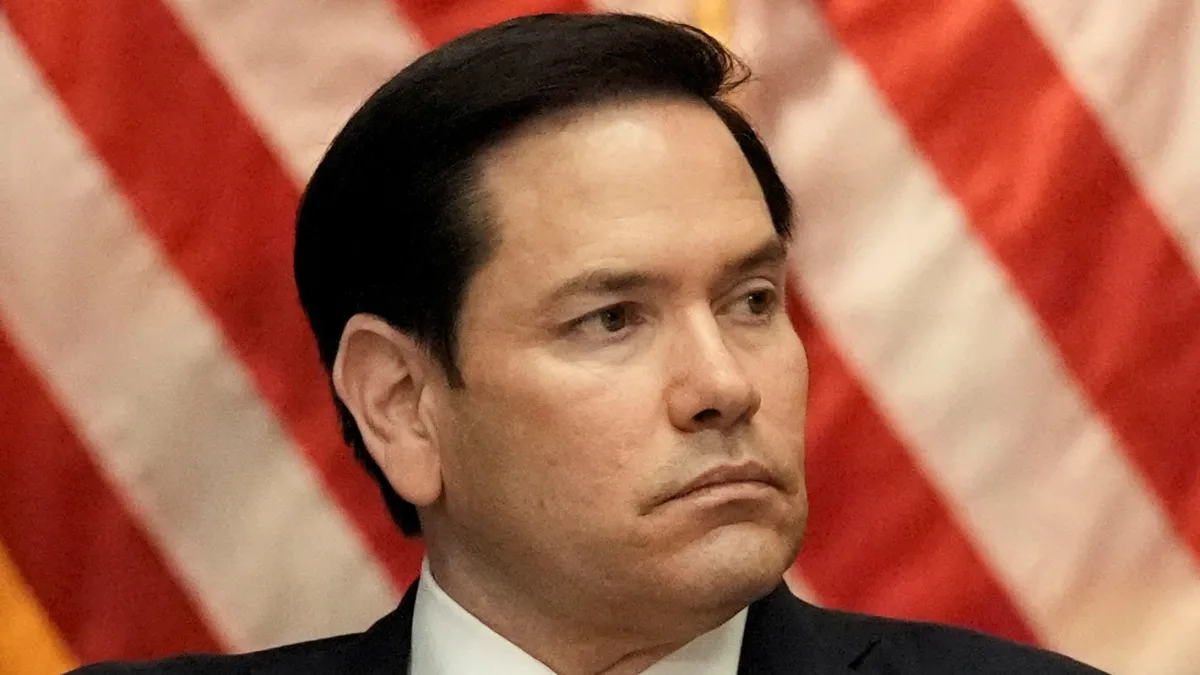
Secretary of State Marco Rubio on Tuesday unveiled plans for a sweeping reorganization of the State Department, including changes that will eliminate 132 offices and about 700 jobs in the first phase of much deeper planned staffing cuts.
“In its current form, the Department is bloated, bureaucratic, and unable to perform its essential diplomatic mission in this new era of great power competition,” Rubio said in a statement that sounded distinctly Trumpian. “Over the past 15 years, the Department’s footprint has had unprecedented growth and costs have soared. But far from seeing a return on investment, taxpayers have seen less effective and efficient diplomacy. The sprawling bureaucracy created a system more beholden to radical political ideology than advancing America’s core national interests.”
Rubio said the changes would bring the department into the 21st century. He posted a proposed new organizational chart and the department said it would be cutting the number of bureaus and offices by about 18%, from 734 to 602. Rubio has reportedly also instructed senior officials at the department to prepare plans to cut personnel by 15%.
Among the most notable changes, the Undersecretary of State for Civilian Security, Democracy, and Human Rights is eliminated. That office looks to advance American values around the world. In a Substack post, Rubio said the bureau “became a platform for left-wing activists to wage vendettas against ‘anti-woke’ leaders in nations such as Poland, Hungary, and Brazil, and to transform their hatred of Israel into concrete policies such as arms embargoes.” He also claimed that the department’s Bureau of Population, Refugees, and Migration had “funneled millions of taxpayer dollars to international organizations and NGOs that facilitated mass migration around the world, including the invasion on our southern border.”
The Office of Global Criminal Justice and the Bureau of Conflict and Stabilization Operations are also cut.
The New York Times notes that the State Department budget is about 6% of the Pentagon’s. “The proposed cuts run counter to President Trump’s indications that he wants to resolve some major crises through diplomacy rather than military action,” the Times’s Edward Wong and Michael Crowley write.
Lawmakers react: Congressional Republicans applauded the proposed changes. “Every program, office, and policy at State must effectively advance U.S. foreign policy goals—not advance progressive ideology,” Sen. Jim Risch of Idaho, chairman of the Senate Foreign Relations Committee, said in a statement. “Secretary Rubio's plans to reorganize the department will do just that. … Change is not easy, but President Trump and Secretary Rubio have proposed a vision to remake the State Department for this century and the fights that we face today, as well as those that lie ahead of us.”
House Foreign Affairs Committee Chairman Brian Mast said that bloat and bureaucracy had prevented the State Department from responding to global changes. “This reorganization will make the State Department leaner and meaner and ensure every dollar and diplomat puts America First,” he said.
Democrats sounded a far different note. Sen. Jeanne Shaheen of New Hampshire, the top Democrat on the Senate Foreign Relations Committee, said in a statement that, while she and many of her colleagues welcome reforms where needed, American leadership in the world is being diminished.
“Any changes to the State Department and USAID must be carefully weighed with the real costs to American security and leadership,” she said. “When America retreats – as it has under President Trump – China and Russia fill the void. A strong and mission-ready State Department advances American national security interests, opens up new markets for American workers and companies and promotes global peace and stability. It remains to be seen how the administration’s latest proposals will achieve that goal.”
Why it matters: The reorganization and cuts come as part of President Donald Trump’s push to scale back the federal government and reshape it to fit his agenda, including the near-total elimination of the U.S. Agency for International Development. The remaining parts of that agency are being moved into the State Department.
The departmental overhaul also comes after years in which China has rapidly expanded its diplomatic network, which surpassed that of the United States to become the world’s largest as of 2019, according to the Lowy Institute’s 2024 Global Diplomacy Index.